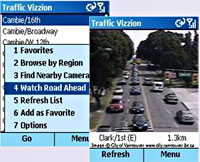 US firm Vizzion have announced the introduction of their innovative traffic-watching system “Traffic Vizzion” to eleven areas in the UK.
US firm Vizzion have announced the introduction of their innovative traffic-watching system “Traffic Vizzion” to eleven areas in the UK.
The system streams roadside and traffic camera videos to smartphones, letting drivers check the route ahead for congestion or other problems.
Users can browse cameras by region, and those with a Bluetooth enabled cell phone and GPS can use the “Watch Road Ahead” feature in Traffic Vizzion to monitor cameras directly ahead.
The display continuously updates to show the next camera up ahead, with no button presses or scrolling required.
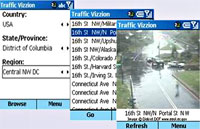 GPS users can also call up a “Find Nearby Cameras” function to list cameras close to their current location, and then select and view any camera from the list in the hope of finding the best way out of a jam.
GPS users can also call up a “Find Nearby Cameras” function to list cameras close to their current location, and then select and view any camera from the list in the hope of finding the best way out of a jam.
Insisting that Vizzion is in fact pronounced ‘vision’, the company’s cheap’n’cheerful Website lists the 11 locations across the UK where the system will initially be available:
Berkshire: Reading area
Glamorgan: Cardiff, Swansea areas
Greater London: 9 London areas
Hampshire: Southampton, Winchester areas
Lanarkshire: Glasgow area
Midlothian: Edinburgh area
Monmouthshire: Newport area
Nottinghamshire: Nottingham area
South Yorkshire: Sheffield area
 Traffic Vizzion runs on Windows Mobile 2003 for Smartphones, and relies on a working Internet connection (e.g. GPRS), with a Bluetooth GPS device required for the added features.
Traffic Vizzion runs on Windows Mobile 2003 for Smartphones, and relies on a working Internet connection (e.g. GPRS), with a Bluetooth GPS device required for the added features.
There’s a free two week trial available from their website, with the regular subscription costing $5 (£3) per month, billable to MasterCard or Visa.
Naturally, you’d also have to add on any data transfer fees from your network provider.
 A new UK survey shows a dramatic increase in the use of picture messaging with WAP also growing in popularity.
A new UK survey shows a dramatic increase in the use of picture messaging with WAP also growing in popularity. When it comes to seeking mobile information online, it’s the geezers who are keenest to get their keypads rattling, with 38% accessing mobile Internet (WAP) sites compared to 26% of ladies.
When it comes to seeking mobile information online, it’s the geezers who are keenest to get their keypads rattling, with 38% accessing mobile Internet (WAP) sites compared to 26% of ladies. Elsewhere, the Mobile Data Association have calculated that WAP page impressions are now approaching the 2 billion per month mark, with the Mobile Media Monitor revealing the most popular types of site on the mobile internet.
Elsewhere, the Mobile Data Association have calculated that WAP page impressions are now approaching the 2 billion per month mark, with the Mobile Media Monitor revealing the most popular types of site on the mobile internet.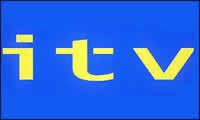 Speculators with a wad of cash might like to consider convert said cash into an ITV plc share holding in the next few days some feel.
Speculators with a wad of cash might like to consider convert said cash into an ITV plc share holding in the next few days some feel. Unlike Sky, which is principally a broadcast platform owner and call centre operator, ITV actually has what companies with desires to be fully-grown media giants badly need; content and a fifty year plus heritage of making TV programmes.
Unlike Sky, which is principally a broadcast platform owner and call centre operator, ITV actually has what companies with desires to be fully-grown media giants badly need; content and a fifty year plus heritage of making TV programmes. Interestingly, after
Interestingly, after  Mr Gates, speaking in the keynote address at the Consumer Electronics Show (CES) in Las Vegas, evangelised the “arrival of the much-trailed ‘digital lifestyle’” (which of course, we here at Digital Lifestyles just loved when
Mr Gates, speaking in the keynote address at the Consumer Electronics Show (CES) in Las Vegas, evangelised the “arrival of the much-trailed ‘digital lifestyle’” (which of course, we here at Digital Lifestyles just loved when  The BBC has announced its Open News Archive, making archive news reports freely available to the UK public to download and use for free in their own creative works.
The BBC has announced its Open News Archive, making archive news reports freely available to the UK public to download and use for free in their own creative works. Made available under the terms of the recently-launched Creative Archive Licence, the footage can be viewed, downloaded, edited and mixed by UK residents – so long as it’s for non-commercial programming (there’s also several other caveats that budding film makers should read first
Made available under the terms of the recently-launched Creative Archive Licence, the footage can be viewed, downloaded, edited and mixed by UK residents – so long as it’s for non-commercial programming (there’s also several other caveats that budding film makers should read first 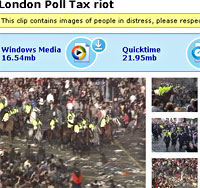 Helen Boaden, Director, BBC News, said: “This trial is an important step in allowing us to share with our audiences the extraordinary news archive which the BBC has recorded over the years. We look forward to getting their reaction.”
Helen Boaden, Director, BBC News, said: “This trial is an important step in allowing us to share with our audiences the extraordinary news archive which the BBC has recorded over the years. We look forward to getting their reaction.” The BBC already offer nearly a hundred clips in their
The BBC already offer nearly a hundred clips in their  The BBC has decided to extend the trial for the iMP Player until 28th February 2006, telling trialists that the extra time will enable it to “understand what you want from the service and how you are using it”. A new upgrade of the software is due to be rolled out to the participating trialists in January.
The BBC has decided to extend the trial for the iMP Player until 28th February 2006, telling trialists that the extra time will enable it to “understand what you want from the service and how you are using it”. A new upgrade of the software is due to be rolled out to the participating trialists in January.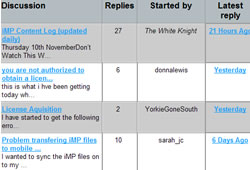 The BBC’s reaction to such sniping is consistent, if not a little bland
The BBC’s reaction to such sniping is consistent, if not a little bland Cambridge outfit, HD Positions, have launched their ‘Boomerang Box’ device, a new low cost, high accuracy positioning system which locates vehicles and other valuable assets.
Cambridge outfit, HD Positions, have launched their ‘Boomerang Box’ device, a new low cost, high accuracy positioning system which locates vehicles and other valuable assets. The service works by HD Positions supplying the interface to Matrix, facilitating related Machine to Machine (M2M) services, including network connectivity, billing and support.
The service works by HD Positions supplying the interface to Matrix, facilitating related Machine to Machine (M2M) services, including network connectivity, billing and support. We tried to find a picture of the actual Boomerang Box, hopeful that it would be an amusing looking thing that would spice up this rather dull report, but there was nothing to be found on their Website.
We tried to find a picture of the actual Boomerang Box, hopeful that it would be an amusing looking thing that would spice up this rather dull report, but there was nothing to be found on their Website.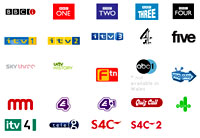 Ofcom has published its Digital Television Update for the third quarter of 2005, revealing that two thirds of UK households now watch digital television.
Ofcom has published its Digital Television Update for the third quarter of 2005, revealing that two thirds of UK households now watch digital television. The number of households with Freeview as their only source of digital television viewing was estimated at 5,775,000 – up by 600,000 homes during the quarter.
The number of households with Freeview as their only source of digital television viewing was estimated at 5,775,000 – up by 600,000 homes during the quarter.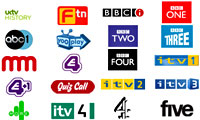 Digital cable subscribers now account for more than 2.6 million of the total cable television homes, increasing by more than 43,300 in the quarter, while subscriptions to analogue and digital cable television decreased slightly to just below 3.3 million in the quarter (due to a fall in analogue cable subscribers outweighing the increase in digital cable subscriptions).
Digital cable subscribers now account for more than 2.6 million of the total cable television homes, increasing by more than 43,300 in the quarter, while subscriptions to analogue and digital cable television decreased slightly to just below 3.3 million in the quarter (due to a fall in analogue cable subscribers outweighing the increase in digital cable subscriptions).